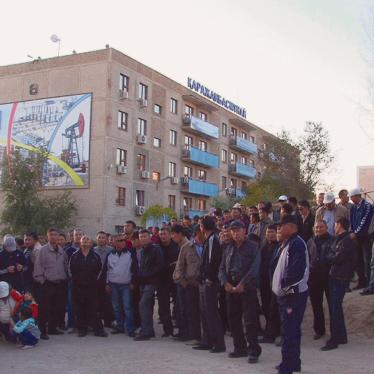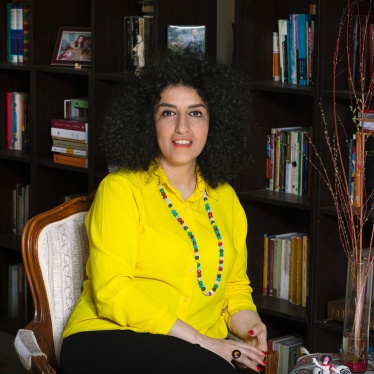July 2, 2013 Update
In its June 27 letter to UK Prime Minister David Cameronabout human rights in Kazakhstan, Human Rights Watch noted that the Kazakh authorities had prosecuted five police officers on charges of “abuse of power or official authority with grave consequences” in relation to violence which broke out in Zhanaozen on December 16, 2011. During the course of the trial, it was established that bullets from the weapons of three of the police officers caused the death of three civilians, one of whom was a minor. Each of the three police officers was convicted of "abuse of office or official authority with grave consequences" and sentenced to five years in prison, the maximum sentence for this offence being 10 years. The sentences were upheld on appeal.
This has been the sole response to the loss of civilian life which resulted from the clashes and violence that erupted around Kazakhstan's Independence Day celebrations in Zhanaozen on December 16, 2011. Official figures establish that when police opened fire they killed 12 civilians. Several other civilians also died on and around this date but allegedly for reasons not directly connected to the violence.
The Kazakh authorities’ investigation into the Zhanaozen violence and the subsequent trial of five police officers fall far short of Kazakhstan’s obligations under international law to ensure effective accountability for each of the grave violations to the right to life by state agents that occurred. To date Kazakh prosecutorial authoritiesstillhave not initiated effective investigations into each of the individual killings that took place on December 16, 2011, in a manner that could establish how each person was killed and whether the state agents’ use of force resulting in the death of unarmed civilians was lawful under international law, and that could assign any individual criminal culpability for each killing.
As Human Rights Watch notes in its letter, the partial and unsatisfactory nature of the authorities’ actions to date, means that there has been no proper investigation of these individual killings and no-one has been held accountable for them.
__________________________
The Rt Hon. David Cameron
Prime Minister
10 Downing Street
London
SW1A 2AA
27 June 2013
Re: The human rights situation in Kazakhstan
Dear Prime Minister
We understand that you will shortly be visiting Kazakhstan. Your meetings will no doubt focus significantly on security, trade and economic issues. However we urge you to take the opportunity to also press strongly on a range of human rights concerns in your meetings with President Nazarbaev and other senior members of the government. We would further encourage you to make time to meet with some of the country’s civil society organisations and human rights defenders during your visit.
Human Rights Watch has been documenting human rights abuses in Kazakhstan for over 15 years. We are very concerned about the serious and deteriorating human rights situation there in recent years, including credible allegations of torture, the imprisonment of government critics, tight controls over the media and freedom of expression and association, limits on religious freedom, and continuing violations of workers’ rights.
As you will be aware, the Kazakhstan government responded very harshly after violence broke out between people, including striking oil workers, who had gathered in an oil town in the western part of the country, and police, following an extended labour strike at the end of 2011. The harmful consequences of this crackdown still reverberate today. Following lengthy strikes in the oil and gas sector, police opened fire on protesters in Zhanaozen in December 2011, killing over a dozen individuals. While the authorities held some police officers accountable for “abuse of power or official authority with grave consequences” there has been no proper investigation of these individual killings and no-one has been held accountable for them. We urge you to press President Nazarbaev to establish a fully independent investigation into these deaths.
From early 2012, the Kazakhstan authorities then began a major crackdown on government critics, resulting in criminal convictions and prison sentences for key activists and the closure of media outlets and an opposition group. The authorities continue to stifle dissent and crack down on critics.
Torture allegations - On June 4, 2012, an Aktau court convicted 34 of 37 defendants, all of whom had been charged with organising or participating in mass riots and other offences relating to the outbreak of violence in Zhanaozen. During the trial, defendants testified that they had suffered beatings, suffocation, psychological pressure, and other forms of ill-treatment, with the presumed aim of coercing confessions against themselves or others. Kazakhstan’s authorities have refused to properly investigate the defendants’ allegations of torture and ill-treatment.
The imprisonment of government critics - On June 4, 2012 Rosa Tuletaeva and Maksat Dosmagambetov were sentenced to seven years and six years in prison respectively for their role in the December 2011 protests (Tuletaeva’s sentence was later reduced to five years on appeal). Tuletaeva and Dosmagambetov alleged they had suffered torture in custody but the authorities have repeatedly declined to open a criminal investigation. On May 22, 2013 the Supreme Court upheld their convictions. On October 8, 2012 an opposition group leader Vladimir Kozlov was sentenced to seven-and-a-half years in prison, in a politically motivated trial marred by due process violations and based on vague and overly broad criminal charges of “inciting social discord”. His sentence was upheld on appeal. On July 1, the Supreme Court will hold a preliminary hearing on whether to further review his case. Unrelated to the Zhanaozen violence, on December 7, 2012, civil society activist Vadim Kuramshin was sentenced to 12 years in prison on charges of extortion following a trial marred by procedural violations. We urge you to press President Nazarbaev for the release of Vladimir Kozlov, as well as the release - pending a full and impartial review of their cases - of Vadim Kuramshin, Rosa Tuletaeva and Maksat Dosmagambetov.
Controls over the media, free expression and freedom of association - The environment for freedom of expression in Kazakhstan is extremely restrictive. Libel, for example, is a criminal offence. In November 2012, the authorities sued key independent media outlets and the unregistered opposition party Alga, alleging that their publications were “extremist”. In December, in rushed and perfunctory trials, Almaty courts also banned online video portals Stan.TV and K+ from producing or broadcasting material in Kazakhstan, and shut down newspapers Golos Respubliki and Vzglyad, as well as their affiliate newspapers and websites. In December 2012, a court further ordered that the unregistered opposition partyAlga be shut down. In addition, theKazakhstan authorities have repeatedly used the vague and overly broad charge of “inciting social,national, clan, racial, or religious discord or enmity”, under article 164 of Kazakhstan’s criminal code, to silence government critics, most recently in March 2013 against a local journalist, Aleksandr Kharlamov, in eastern Kazakhstan. His case is ongoing.
The Kazakhstan authorities maintain highly restrictive rules on freedom of assembly. Peaceful public meetings of a political nature are often denied a permit and authorities regularly bring charges against participants of unsanctioned protests, sentencing them to fines and imprisonment. On May 22 and 23, for example, a court in Astana sentenced two civil society activists - Esenbek Ukteshbaev and Bolatbek Blyalov – and a journalist, Berik Zhagiparov, to between 7 and 15 days in detention and fined nearly two dozen others for violating the law on public assemblies.
The Kazakhstan government should be pressed to end these restrictions on independent media and to bring their laws on freedom of expression and association into line with international standards.
Limits on religious freedom - Following the adoption in 2011 of a restrictive law on religion—which outlaws any practice of religion in association with others and without state permission—respect for religious freedoms has declined significantly. Hundreds of small religious groups have been forced to close, unable to meet the 50 person membership requirements for re-registration, compulsory under the new law. On May 17, 2013 the authorities arrested Bakhytzhan Kashkumbaev, a pastor at Grace Church in Astana, on dubious charges of “deliberately causing harm to health.” Authorities allege that “under the guise of charitable and religious activity,” he caused psychological harm to one of the members of Grace church. He faces up to seven years in prison.
The violation of workers’ rights - Human Rights Watch’s in-depth research on violations of internationally protected workers’ rights in Kazakhstan has documented extensive restrictions by the government and three companies in the petroleum sector on the ability of workers to organise and bargain collectively, alongside mass dismissals of workers following strikes in 2011 in western Kazakhstan. We have also documented attempts by the authorities to break peaceful strikes and the imprisonment of union leaders on politically-motivated charges in trials that did not adhere to fair trial standards.
Consistent with your government’s stated commitment to make human rights a central focus of UK foreign policy, it is essential to convey to the government of Kazakhstan your deep concern about serious and continuing rights violations there and the need for the government to take decisive action to address them. We would also respectfully suggest that it is important to make reference to some of these rights concerns in any public statements you put out during or after your visit, not least so that rights defenders in Kazakhstan are aware that these concerns have been raised.
Thank you in advance for considering these matters. For information, we have sent some additional material to your staff, including suggestions for human rights defenders we believe would be important for you to meet as part of your visit.
We wish you a successful trip.
Yours sincerely,
David Mepham
UK Director
Hugh Williamson
Executive Director
Europe and Central Asia Division







